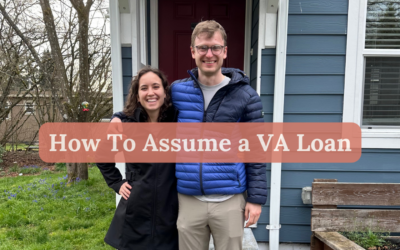MAKING THE RIGHT INVESTMENT
Buying an Investment Property, or one that will not be your primary residence is a much different process compared to purchasing your first home. Use this information as an outline to prepare yourself for making the right investment. I’ve owned several rental properties myself and aim to teach you how to skip the hard lessons I’ve learned so you can hit the ground running!
If you are looking to purchase a second property for leisure or vacation in Tacoma, head over to our blog to learn about areas that other homebuyers are investing, for their vacation home in the greater Tacoma area. You’ll be glad you did!
FINANCING YOUR INVESTMENT PROPERTY
When buying an investment property, there are several differences with regard to financing that you need to know. First and foremost, it is required that you use a Conventional Loan and put at least 20% as your down payment. If you put 25% down, your interest rate will be significantly improved. There is no getting around this, unless you plan to live in the property for at least 2 years after purchasing. If you intend on purchasing a multi-family residence; live in one unit and rent out the other(s), you can use other financing options. Read more about how financing you’re home purchase here
Interest Rates are higher when purchasing a non-owner occupied real estate investment. As a general rule of thumb, the interest rate for a non-owner occupied home will be about 0.5% higher than a traditional owner-occupied home. This too depends on your credit score and you always have the option to buy down your interest rate. The cost to buy down one “point” (ball park) is 1% of the loan. If this is going to be a long term investment for you, consider buying down your interest rate. The first point or two usually pays for themselves in 5 – 7 years. You’ll be glad you did! If, however, you plan to refinance shortly after purchasing your investment property, don’t bother buying down your interest rate.
Feeling compelled to invest in a fixer upper and get your hands dirty? Wait just a second. If it is a real “fixer upper” the bank may put a stop to it. I’ll be able to advise you on what will finance and what will not. Refer to “selling as is” for more guidance on what will and will-not finance.
RATE OF RETURN
What can you expect to make on your real estate investment? This varies significantly depending on the area that you invest in and whether it is a buyers or sellers market. If it is a strong sellers market (like the one we are in right now) your monthly profit (better known as cap rate) is going to be lower. A ballpark figure for multifamily units in the greater Tacoma area is between 4 – 7%.
CONDITION OF THE HOME
More risk, more reward. If you are investing in a home or Multi-Family property that needs significant repair and renovation, you can expect to get a higher rate of return compared to other investment properties in the neighborhood after the renovation is complete and rented!
VACANCY RATES
Of all the variables that are thrown your way as a Real Estate Investor, the number one thing that affects you bottom line is vacancy rate. This is the reason why some landlords choose to stabilize their rents rather than raise them, for fear that the tenant will move. If your rental is vacant for even one month out of the year, you are losing over 8% of your annual earning.
LOCATION, LOCATION, LOCATION!
When I think of the rate of return on a property, I often think of the game Monopoly (my childhood favorite!) We all wanted Park Place and Boardwalk. The problem was the cost of entry AND THEN the cost of building houses and hotels. The cost of “building” houses and hotels is significantly more than any other area and after you build houses (or in this case renovate) it would take a bit longer to get your investment back.
When thinking about buying in more expensive neighborhoods (In Tacoma, think of Proctor, Old Town and North Slope), you will see a much lower rate of return. On the contrary, you will see higher appreciation year-over-year and potentially fewer vacancies. but if you aren’t planning on selling in the near future, this doesn’t matter.
Be realistic with location. Proximity to your primary residence is a huge factor when making the right investment, especially if you plan to be your own landlord.
SIZE MATTERS
What is the ideal size of a rental unit? We are talking about the size of the unit itself, not the size or unit count in the entire building. I’ve heard many tenured investors say that the ideal rental is 3 beds, 2 baths. The argument is that they stay rented and are more likely that you get a tenant who stays for longer than a year.
Much like qualified Home Buyers, there is a larger pool of applicants for homes listed for $400,000 or less, than there are $1,000,000 or more. Do not invest in a seven bedroom home when the average home size in the area is three bedrooms. You’ll be sorely disappointed when you can’t keep it rented.
The City of Tacoma is actively working on building more housing units to alleviate our growing Housing Affordability Crisis. To learn more about what the city is doing and play, read our blog! BUILDING AFFORDABLE HOUSING IN TACOMA
PROPERTY MANAGEMENT
Filling vacancies is the number one reason why investors choose to hire a property management company. Most property owners do not have the time or resources to do the due diligence of finding new tenants, nor do they want to take on the risk of not abiding by all Fair Housing Rules.
Perhaps you have the flexibility in your job to properly oversee your building and the care of your tenants – great! This section isn’t for you! But for most of us, it’s hard to find the time in the day to eat an adequate lunch, let alone follow-up with tenant concerns and coordinating ongoing maintenance and care of the building. Hiring a 3rd party to oversee your property and tenants. This maybe a necessary component to being a successful landlord and long-term real estate investment.
In the greater Tacoma Area, you can expect to pay between 8% – 10% of your total monthly income for the services of your property manager. In addition, most charge an additional fee when filling vacancies. (Do you see now how vacancies can really run Landlords into the ground?) It’s not cheap! There are other Property Management services that offer limited service or simple screening of tenants. These is usually a one-time fee or limited fee. They do not, however, handle the delivery and deposit of rent, care of the building or communicate with the tenant. Real estate is a long-term investment, and it doesn’t just happen! It takes time, energy, and commitment to be a successful investor and (potential landlord).
Ready to chat? Call/text your local Real Estate Expert, Jenny Wetzel to find your next Real Estate Investment (253) 381-9788





